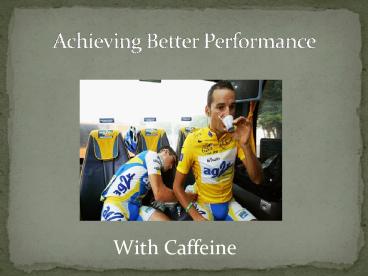Achieving Better Performance - PowerPoint PPT Presentation
1 / 18
Title: Achieving Better Performance
1
Achieving Better Performance
With Caffeine
2
- Caffeine
- Increases Concentration
- Increases tolerance to pain
- Improved coordination and speed
- Ability to handle mental or
- physical stress for longer periods
- of time
3
- Caffeine binds to the receptors
- Brain
- Heart
- Skeletal Muscles
- Fat cells
4
Absorbed by the stomach and small
intestineTransmitted through the bloodstream to
the brainAffects the Central Nervous System
5
Caffeine binds to the ATP receptors without
activating the ATP (Antagonist)
6
With caffeine bonded to the receptors
- Messages are sent to the brain
- More alert
- Relays a sense of being energized
- Improves concentration
- Speeds reaction time
- Power is elevated for longer without
feeling like you are working harder
7
Highest amount of caffeine is found in the
skeletal muscles.
- Glucose energy
- Oxidized in cell respiration to carbon dioxide
- and water
- Produces energy in the form of ATP
- Extra glucose stored in the cells as glycogen
8
Muscles need energy to contract
- Glucose is depleted by exercise
- Body turns to fat for fuel
- Caffeine releases fat storage while storing up to
50 of its glucose - With glucose stored, the body utilizes the fat
for fuel. - Lactic acid build-up is delayed
- Allows for longer exercise
9
Side effects of caffeine
- Sleep Deprivation
- Nausea and Cramping
- Anxiety and Confusion
- Rapid Heart Beat
- Fatigue
- Headaches
- Gastrointestinal Instability
10
- Negative side effects that could affect the
athlete - Muscle tightness
- Muscle cramping
- Dehydration
11
High doses of caffeine leads to caffeinism
- Anxiety
- Restlessness
- Sleep disorders
- Depression
12
Positive effects for the athlete
- Stimulates the heart, respiratory system
- Increases blood circulation
- Raises blood pressure
- Helps to prevent dehydration
13
Conflicting DataCaffeine does not alter fluid
balance, sweat rate, total water loss and does
not increase heart rate in exercise.
14
Research indicates caffeine may benefit in
preventing heart disease or at least lower the
incidence of heart disease
15
The amount of caffeine ingested, the body weight
and, how often it is consumed can determine the
effects it has on the athletes performance.
16
Caffeine The Drug of Choice Athletes will
continue to consume caffeine to give them the
competitive edge. Athletes know they can
perform longer without feeling like they are
working harder.
17
The End!!
- Produced by
- Lynn Nelson, Terri Blanchard and Judy VanFossen
18
- Back in the Game Sports Medicine is a clinic
dedicated to the treatment of physical injuries
to the body. Caring for an injured body involves
more than making the diagnosis it's about
understanding and treating the cause to prevent
future injuries. The clinic addresses injuries of
the spine, extremities, sports, and auto/work.































